National
Soaring hits and dramatic misses at the HRC/CNN LGBTQ Town Hall


Living history. That’s what it felt like inside The Novo theatre at the HRC/CNN LGBTQ Town Hall last Thursday night as nine Democratic presidential candidates showcased their commitment to LGBTQ issues and their plans to advance full equality and end the scourge of AIDS and conversion therapy. Gay presidential candidate Pete Buttigieg and gay CNN moderator Anderson Cooper were well aware they were living history on stage, but, to borrow from The Shirelles, will they all still love LGBTQs tomorrow?
The CNN stage Tuesday night is crowded with 12 Democrats who aspire to topple Donald Trump and live in the White House. The moderators are asking about impeachment, the new Trump-caused war in Northern Syria, immigration, climate change and gun violence.
Sen. Bernie Sanders has returned to campaigning after a heart attack and former Vice President Joe Biden and Sen. Elizabeth Warren have readied their flak jackets for all the incoming grenades tossed by candidates hoping to breakout of single digit poll numbers. Out Mayor Pete Buttigieg is hoping to capitalize on all the thumbs-up, while Sen. Kamala Harris, once considered the female Barack Obama shoe-in, is struggling – she seems to know everything but her message.
Ratings for the Democratic Party’s fourth official debate in Westerville, Ohio are expected to be high, given the near certainty of Trump’s impeachment by the House – but there is also a nauseating feeling that Trump could still turn ashes into confetti and win re-election in 2020. Who on that stage can defeat him?
CNN’s production of the LGBTQ town hall, in partnership with the Human Rights Campaign Foundation, reached 1,430,000 viewers during Buttigieg’s third segment at the peak of the four-and a half-hour program. He was preceded by Biden, who brought in 1,336,000 viewers, and followed by Warren with 1,398,000 viewers. The audience started dipping after that with 1,174,000 viewers watching Harris.
“These are pretty good ratings for the town halls. They are not gangbusters like a debate, but they are better than some that CNN has had earlier in the cycle,” Ted Johnson, Washington correspondent for Deadline, tells the Los Angeles Blade. “The network also emphasizes that it has these not for the audiences but to show their commitment to covering the campaign.”
A ratings junkie, Trump offered a little counter programming on Fox TV with a 102-minute rambling, incoherent and racist campaign rally in Minneapolis, Minnesota – the heavily Somali district represented by Trump nemesis, Ilan Omar. And while the Democrats appealed to LGBTQ voters and allies, Trump unleashed a bombastic sideshow that roused his supporters and left others questioning his mental stability, including acting out “a truly terrible imitation of [FBI employees] Peter Strzok and Lisa Page achieving orgasm,” as Esquire described it.
Saturday Night Live devoted their cold open spoof to the HRC/CNN Equality Town, with a cryptic Anderson Cooper should shrug acknowledging “we’ll never do this again.” But it was former HUD Sec. Julián Castro (Lin-Manuel Miranda) who best nailed the subliminal message of the event: “Well, first of all, gracias. As a Democrat, I want to apologize for not being gay, but I promise to do better in the future.”
What is not a joke is that 11,046,000 LGBTQ adults are still officially second class citizens – the result, the town hall helped underscore – of institutionalized and systematic homophobia, biphobia and transphobia. Additionally, since 2016, HRC has identified more than 57 million “Equality Voters” nationwide who “prioritize LGBTQ-inclusive policies, including marriage equality, equitable family law and laws that would prohibit discrimination on the basis of sexual orientation and gender identity,” says HRC.
In 2018, LGBTQ voters counted for 6% of the entire electorate and cast more than 7 million ballots — a turnout of roughly 70%, compared to a turnout of 50% among the general population.
In 2020, the lives and livelihoods of LGBTQ people are at stake. The town hall occurred two days after the Supreme Court heard three job discrimination cases on whether the firing and harassment of an employee based on that worker’s sexual orientation or gender identity qualifies as sex discrimination under Title VII of the Civil Rights Act? According to an Associated Press analysis,“a ruling that says the federal law doesn’t protect workers targeted because they’re gay or transgender could leave millions vulnerable in more than half of U.S. states.”
An analysis released Oct. 9 by the Williams Institute at UCLA School of Law based on a poll conducted with Reuters/Ipsos of candidate preferences found that nearly 9 million LGBT adults are registered to vote, with half registered as Democrats, 15% registered as Republicans and 22% Independents and the remaining respondents picking another party or demurring on identifying one.
And yet, as Marketwatch extrapolated from the Williams Institute report, around 21% of LGBTQ adults are not registered to vote. That means there are roughly two million more LGBTQ adults still to be registered to vote in the 2020 election.
Two million. And that’s not counting those who want to vote but are shut out or dissuaded or uninspired.
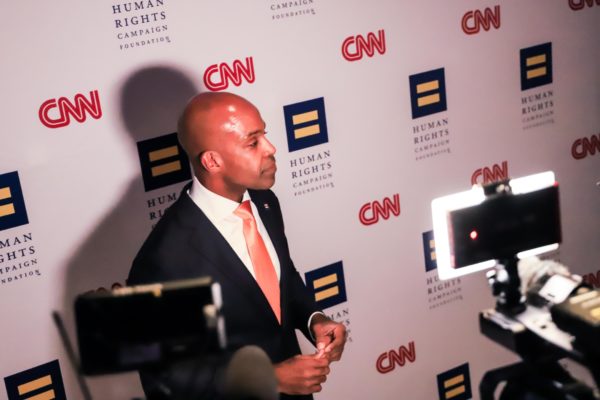
“Voter suppression has primarily targeted voters of color, who also happen to include LGBTQ Americans, who far too often face disproportionate barriers in accessing their right to vote,” HRC President Alphonso David told the Washington Post after HRC backed a voting-rights effort organized by former Georgia gubernatorial candidate Stacey Abrams. Some states, for instance, have voter-ID laws where the person is required to show documentation that matches their birth-assigned gender, which could impede a transgender person from voting. The National Center for Transgender Equality Action Fund has a project to help with that – Transform the Vote that explains #VotingWhileTrans.
One hope was that the HRC/CNN town hall would engage voters, as well as get the candidates on the record about specific LGBTQ issues and introduce non-LGBTQ Americans to the human beings behind those issues. Buttigieg and Warren put out detailed, comprehensive LGBTQ plans and Harris pledge to create a White House advocate for LGBT affairs. Beto O’Rourke put out his LGBT plan last June.
Numerous intersectional issues were addressed such as trans military service, HIV/AIDS, suicide and mental health, youth homelessness, gun violence and education and school safety, as well as civil rights and full equality under the Constitution.
Some new details emerged about some of the candidates. For instance, when CenterLink’s Tanya Tassi asked Harris about the three Title IX employment discrimination cases before the Supreme Court, the California Senator noted that she had joined in a friend of the court brief to “stand in solidarity with all of the folks who are fighting for equality in those three cases.”
And when LA-based HIV-positive dancer and choreographer Thomas Davis asked Harris how she would combat high HIV rates in minority communities, she not only talked about high rates for Black gay men and access to PrEP but shared a personal story about sitting at the bedsides of men who died from AIDS, including Jim Rivaldo, her campaign manager when she ran for San Francisco DA – he was also Harvey Milk’s campaign manager.

“He would always talk about the need to recognize that within the community there are real hierarchies based on race and income and we need to recognize and deal with that,” Harris said. “And since those days to today, we know that in terms of HIV-AIDS rates among black men in particular, it is still much higher because the hierarchy still exists within the community around access to health care, housing, employment, and things of that nature.” She then committed to end HIV/AIDS “within a generation.” (JavonTae Wilson, an HIV counselor and tester for In the Meantime Men, asked a similar question of Sen. Klobuchar).
Contrast that with billionaire Tom Steyer who was asked by Nia-Malika Henderson about living in San Francisco in the 1980s during the height of the AIDS crisis. He noted that no one knew how broad the epidemic would become but research and the response from the community was strong.
“So I look at this as a place where there was something very scary and out of control, that Americans — and don’t forget, President Reagan would never admit to the AIDS crisis or do anything about it,” Steyer said. “But the country responded itself. Researchers responded. People in the community responded. People in churches responded. Actually, there was a great deal of caring that went out. And as devastating as it was in San Francisco, it wasn’t nearly as bad as people were worried about, Nia, and that was really as a result of the work and caring that people put in.”
Henderson didn’t follow up to ask him to clarify what he meant by “it wasn’t nearly as bad as people were worried about.”
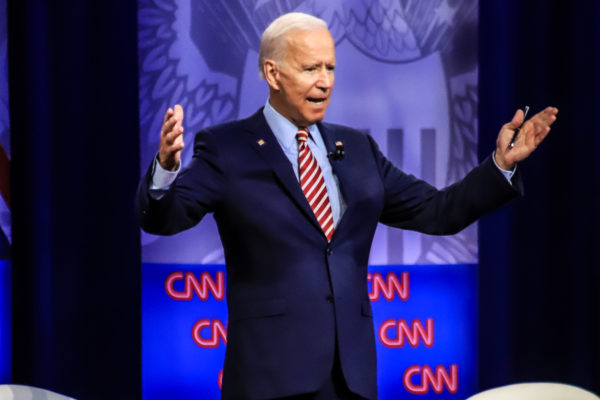
In another instance, Anderson Cooper asked Joe Biden what he would do if the Supreme Court ruled that the Civil Rights Act does not protect LGBTQ workers. Biden said he’d pass the Equality Act “right off the bat.” He thinks such protections are constitutional because “I taught constitutional law for 21 years in law school as a constitutional professor, I believe it clearly is covered, clearly is covered.”
Some eyebrows went up. Biden – a constitutional law professor? Actually yes, Jamal Brown, Biden’s National Press Secretary, tells the Los Angeles Blade, except for 17, not 21 years, at Widener University. He points to an Aug. 27, 2008 article reporting that “Biden has been an adjunct law professor at the school for 17 years, co-teaching a class, ‘Special Studies in Constitutional Law.’” One of the proud students watching then-Democratic vice presidential contender Biden speak said: “”I thought it was amazing…,I thought it was very true. He’s a straight guy.”
There were some other confusing moments. In off the record conversations during and after the event, many thought Warren “won” the night, especially after her hysterical take on same sex marriage that caused such an uproar, it distracted from a Buttigieg press availability backstage.
When asked how she would respond to someone saying they believe marriage is between one man and one woman, Warren said: “Well, I’m going to assume it’s a guy who said that. And I’m going to say, ‘just marry one woman.’ I’m cool with that.” She turned, took a comic beat, then added: “Assuming you can find one.”
It was one of the biggest hits of the evening, one that continues to be cited by news outlets reporting on Warren. But there were some dramatic missed opportunities to display cultural competence, too.
For instance, when CNN anchor Chris Cuomo asked Warren about her 2012 comment regarding a judge’s ruling that granted transition-related surgery to a transgender inmate. During her Senate campaign, she said: “I don’t think it’s a good use of taxpayer dollars.”
“Do you regret that?” Cuomo asked.
“Yep. No, it was a bad answer. And I think it was a bad answer. And I believe that everyone is entitled to medical care and medical care that they need, and that includes people who are transgender, who — it is the time for them to have gender-affirming surgery. I just think that’s important and the appropriate medical care,” Warren said.
Though not an explicit apology for her Senate campaign remark, many took it as the equivalent of Harris “taking full responsibility” for her office’s refusal to grant transition healthcare to a trans prisoner when she was DA. But it was the next response that threw people.
“So if you help people get to where they want to be, you also have to protect them as what they are,” Cuomo said. “Do you think that a crime against somebody who is transgender should be charged as a hate crime in statute?”

“You know, I think we could if we think that’s going to be the most effective way to make change. So I’m certainly — I’m open to this,” she said. “But I’ll tell you what I really want. I want a Justice Department that takes this seriously. I want to create a Justice Department that says these crimes matter.
“And when they’re not federal crimes,” Warren continued, “when they are state crimes, in the same way that our Justice Department is empowered to step in if a state is failing to enforce laws and as a result it’s leaving women unprotected, it’s leaving people of color unprotected, the same should happen for LGBTQ people. We need a Justice Department that is on the side of the people, all of the people.”
Did Warren just say she didn’t back a federal hate crime law that included transgender people—with Judy Shepard in the audience? The Los Angeles Blade reached out to her campaign for clarification.
“Gender identity is currently covered by federal hate crime laws and a Warren Administration will use this statute to prosecute,” spokesperson Saloni Sharma told the Los Angeles Blade. “Elizabeth was making the point that hate crimes prosecutions are not a sufficient answer – we need to go further to make addressing this issue a priority for the Department of Justice, attack the roots of the crisis, and prevent violence. She has also co-sponsored the NO HATE Act to strengthen hate crime reporting as one of the ways to do that.”
What viewers did not know was the backstage drama that happened before the event. Roughly a half hour before showtime, CNN pulled a scheduled question from LA-based trans personality Ashlee Marie Preston. Though Preston described the withdrawn invitation to Out Magazine as being “an act of erasure,” a reliable source with knowledge of the incident told the Los Angeles Blade that the question was pulled because Preston was supposed to ask it of Warren but had not disclosed to CNN that she was a paid campaign surrogate, which made her a “plant” questioner and therefore, an ethical conflict of interest to the news production.
CNN only learned about Preston’s financial association with the campaign after a video in which she appeared was posted by Team Warren on Twitter. CNN later learned of the racist and homophobic tweets Preston posted over the years, for which she has somewhat apologized.
Warren’s campaign did not respond to a request for comment about Preston’s tweets.
But Preston’s absence was part of a felt vacuum for trans representation, especially the need to elevate Black trans women of color who, with 19 or 20 murders in 2019, are experiencing an epidemic of violence and hatred, about which HRC is well aware.
There were a number of trans people who were able to briefly share their stories through the questions they asked.
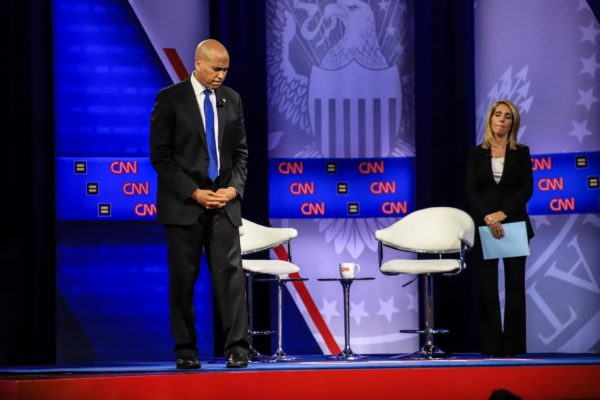
The very first question of the night was for Sen. Cory Booker from Rachel Gonzalez, mother of a 9-year old trans daughter from Dallas and a member of the Human Rights Campaign Parents for Transgender Equality Council. Jacob Lemay, an elementary school student from Massachusetts who identified as “a 9-year-old transgender American, asked Warren a question about school safety. And Gavin Grimm, now 20, told Booker how he sued his high school in 2015 to use the boy’s restroom – a case that went on a legal roller coaster for four years until he finally won on Aug. 9, 2019.
Also representing the trans community were U.S. Air Force combat vet Shannon Scott; Khloe Perez-Rios, a community organizer from Rancho Cucamonga who works at Bienestar; Mariana Marroquin, program manager for the LA-based Trans Wellness Center; and fabulous Black trans singer/songwriter Shea Diamond (who made sure Nia-Malika Henderson pronounced her name correctly); and Black trans activist Carter Brown who was fired from his job in Texas. Andrea Jenkins, the first trans member of the Minneapolis City Council, was Klobuchar’s guest and HRC National Press Sec. Sarah McBride, a candidate for Delaware State Senate, got a shout out from Biden.
But despite the diversity among the questioners and the respectful understanding that one of these Democrats could become the next President of the United States, there was a painful sense of the lack of urgency to the ongoing crisis of the murder and violence toward Black and Brown trans women.
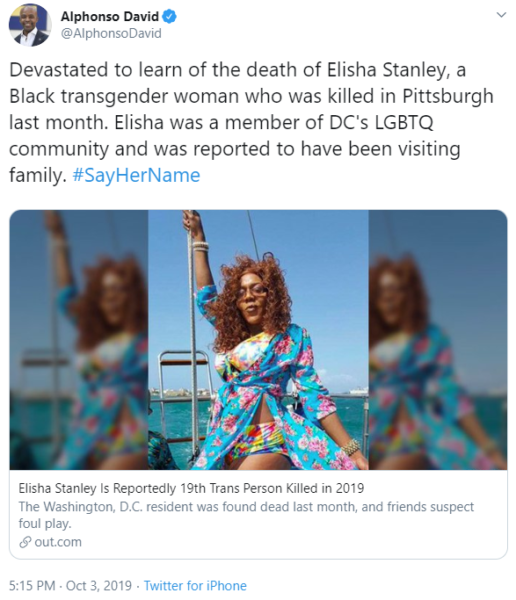
TransLatin@ Coalition founder Bamby Salcedo, along with Maria Roman-Taylorson, and and Michaé Pulido decided to do something about it, chanting and waving a trans flag with the message about trans murders, disrupting Buttigieg’s segment of the HRC/CNN Equality Town Hall.
“The reason we decided to do it when Pete Buttigieg was onstage is because he is a member of the LGBT community and we wanted for him to see first-hand the violence where at least 20 trans women have been killed,” Salcedo told the Los Angeles Blade.
“We needed to show him the importance of addressing the violence against trans women as a priority and to really make sure he understands what needs to happen in order for us to have better life within our broader LGBT community and the broader society,” she said. “We wanted the national mainstream audience to get the broader message.”
Salcedo also noted how roughly they were treated by security. “The way security handled us was inappropriate, even violent, simply because we were trans women,” Salcedo said. “Honestly, I think law enforcement has the mentality to be rough toward trans women, period. That has to change.”

Anderson Cooper was a little thrown but remained calm.
“People are dying,” the TransLatin@ Coalition protesters yelled.
“It’s OK. It’s OK. Be cool. It’s OK. It’s OK. Hey, hey, hey, hey, guys, guys, guys,” Cooper said to the trans women. “Yo, guys, chill out. Guys, relax, relax.”
Cooper then tried to explain the disruption to the million-plus viewers.
“Let me just point out there is a long and proud tradition and history in the gay, lesbian, and transgender community of protest, and we applaud them for their protest,” he said to applause. “And they are absolutely right to be angry and upset at the lack of attention, particularly in the media, on the lives of transgendered….”

After the protesters were led away, Buttigieg got his question.
“And before turning to it, I do want to acknowledge what these demonstrators were speaking about, which is the epidemic of violence against black trans women in this country right now.
(APPLAUSE)
“And I believe or would like to believe that everybody here is committed to ending that epidemic, and that does include lifting up its visibility and speaking to it.
(APPLAUSE)
It’s also a reminder of something at stake in your question, which is just how much diversity there is within the LGBTQ+ community. And I’m very mindful of the fact that my experience as a gay man, but as a white, cisgender gay man, means that there are dimensions, for example, of what it’s like to be a black trans woman that I do not personally understand.
But I also think the diversity within the LGBTQ+ community is part of what we have to offer right now. Our community, our country is so torn apart, we’re so fragmented, and here we have the LGBTQ+ world that is everywhere. We are in every state, every community. Whether folks realize it or not, we’re in every family. And that means we can also have the power to build bridges.
And when somebody’s weighing whether to come out or just coming to terms with who they are, it’s really important for them to know that they’re going to be accepted. There is no right or wrong way to be gay, to be queer, to be trans. And I hope that our own community, even as we struggle to define what our identity means, defines it in a way that lets everybody know that they belong among us.”
After Salcedo was taken away and the televised questioning resumed, it was up to Blossom C. Brown to raise the stakes again.
Lizette Trujillo, from Tucson, Arizona, was about to ask about her transgender son when she suddenly stopped. “I just want to take a moment before I ask my question to validate the pain of our transgender siblings that demonstrated earlier and that have spoken up today, especially black trans women, she said.
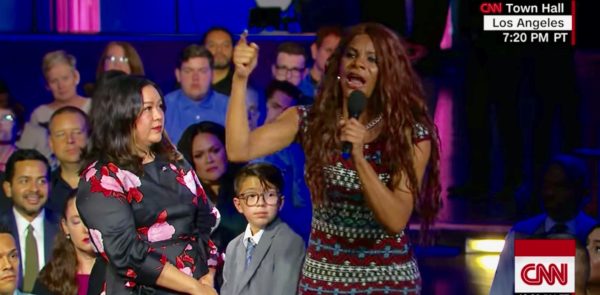
Then came Blossom C. Brown, who swiped Trujillo’s microphone. Here’s how the exchange unfolded:
“I don’t want to take this away from you but let me tell you something – Black trans women are being killed in this country. And CNN, you have erased black trans women for the last time. Let me tell you something. Black trans women are dying. Our lives matter.
I am an extraordinary Black trans woman, and I deserve to be here. My Black trans sisters that are here. I am tired. I am so tired of just sitting there. And it’s not just my Black trans women…
LEMON: Ma’am. Ma’am.
BROWN: It’s my Black trans brothers, too. And I will say what I’m going to say. I’m going to say what I’m going to say.
LEMON: No, no, no, just come here. No, I just want to ask you something. Come here. Tell me. I want you to talk — what’s your name?
BROWN: Blossom C. Brown.
LEMON: Blossom, let me ask…
BROWN: Google me. Please Google me.
LEMON: Blossom, thank you. Let me tell you something. No, don’t come on the stage. And can I — may I have the mic?
BROWN: OK.
LEMON: May I have the mic? Blossom, let me tell you something. The reason that we’re here is to validate people like you. That is why we’re giving — but that is why we’re here.
BROWN: (OFF-MIKE) your actions do not say that.
LEMON: OK, but…
BROWN: Not one black trans woman has taken the mic tonight. Not one black trans man has taken the mic tonight.
LEMON: Yeah. Yeah. Hang on. We can’t hear you. Blossom, we can’t hear you. Here. Blossom, we can’t hear you.
BROWN: Baby, your actions have to speak louder than words. Because guess what? Not one Black trans woman has taken the mic tonight. Not one Black trans man has taken the mic tonight. Show me.
LEMON: Blossom, Blossom…
BROWN: (OFF-MIKE)
LEMON: OK, thank you, I appreciate it. Blossom, you’re a Black trans woman. You have the mic in your hand. I’ve given — I’ve taken it and given it back to you. We want to hear from you. We have had trans people of color. We have all people here. And you’re welcome — but we — but we are proud and happy that you’re here. We’re proud and happy that you’re here. Yes, but, remember, we’re under a time constraint. All right. Thank you, Blossom, and I appreciate it.
BROWN: Yeah, that’s how anti-Blackness works, amongst people of color. That’s what anti-Blackness looks like, the erasure of Black trans people.
LEMON: All right.
BROWN: I’m here. We are here in this room. Please give us that opportunity.
LEMON: Blossom, thank you so much. And we appreciate it. Thank you very much. Yes, no, I got it. There we go.
(APPLAUSE)
Congressman, please address that. Do you want to address that?
O’ROURKE: I’d be happy to. Yeah.
LEMON: Thank you, Blossom.
BROWN: I just want to remind everyone that Stonewall was led by transgender women of color, and it’s 15 years later, and we’re still failing you as a community. But there are mothers like me and other community members that are committed to change. And so thank you for allowing that.
LEMON: Thank you.
(APPLAUSE)

O’Rourke commended Don Lemon: “And then I want to commend you, because after Blossom took the microphone from you, and then returned it after what she said, you acknowledged that she did not grab the mic to speak out against anybody, or to put down anybody. She grabbed the mic to stand up for herself and other trans women of color and trans men of color that she talked about, as well. That’s what democracy looks like in America.”
Brown later told the Los Angeles Blade that she is hoping to organize a forum specifically tackling the issues of significance to Black trans women. (Go to her Facebook page to watch for developments)
HRC President Alphonso David later tweeted an apology:
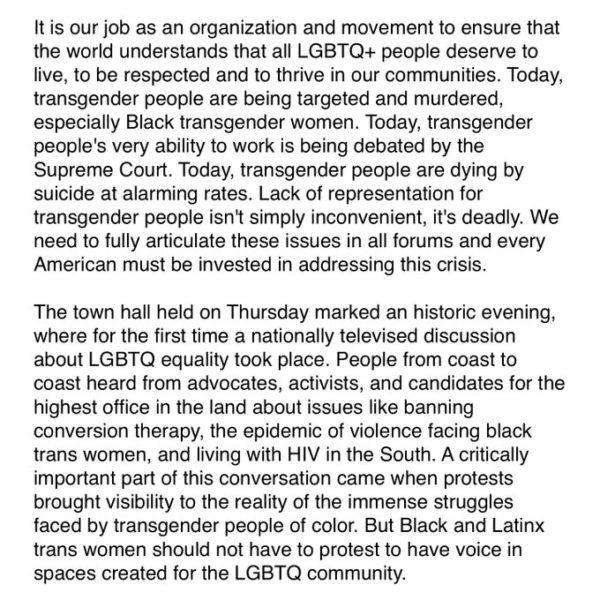
What has not been addressed is the lack of attention to lesbian, bisexual and non-binary people.
Lesbian pioneer Karla Jay, PhD, Professor Emerita of English and Women’s & Gender Studies at Pace University in New York, wrote an op-ed for the Los Angeles Blade in which she laments the missing lesbians.
“When the CNN/HRC (Human Rights Campaign) televised LGBT Town Hall ended at midnight on the East Coast, I felt more like I had survived an entire Jerry Lewis Telethon for Muscular Dystrophy (OK, this dates me) rather than an informative interchange between Democratic candidates and a lively audience. When I unscientifically polled “Friends” on Facebook afterwards, not one of perhaps 700 lesbians admitted to having watched the event. My bluest of the blue lesbian friends visiting from Florida confessed that they had fallen asleep not far in,” she wrote. “But it wasn’t Lesbian Nation’s fault for conking out at the remote when HRC’s questions totally ignored us.”
Yes, towards the ends, in one question “asking about medical coverage for her spouse, one woman referred to herself and her wife, and there was one bisexual and one nonbinary person,” she wrote. “For some reason, the general public and even many gay men seem to think that lesbians have no specific issues except to worry about which half of a couple will get custody of the cat after a divorce, who will win the lesbian softball tournament, and what should be brought to the vegan potluck. However, not being seen is not the same as being well off or content.”
Like straight women lesbians tend to live into old age and become victims of elder abuse, denial of services, forced to separate from a partner when seeking assisted living or at a homeless shelter. And what about reproductive health and creating a family by having “access to alternative insemination in every state, and justice for both biological and nonbiological parents in the event of a separation or divorce.
According to The Washington Post, “there are 5.5 million lesbians in the United States—most of them presumably of voting age. The robust lesbian communities in Michigan, Wisconsin, and Pennsylvania could turn those states blue,” Jay writes. “Reaching out to lesbians is an uncomplicated strategy that could pay big dividends. But suggesting by omission that our lives don’t matter is a strategic error.”

Non-binary people got really short-changed. Oscar Buckland, an LA-based community college student who identifies as non-binary asked Amy Klobuchar: “In California, I am able to change my gender to X. However, on the federal level, there is no such option. Will you recognize third gender markers on a federal level?
“Yes. Thank you. I will,” she said. “And I think there’s also — you know, I think that there is a lot of work we need to do, all over the country, with driver’s licenses, as you know. Not every state has some of the provisions that California have in place and just work on a state-by-state basis to make those changes. So, thanks for asking the question.”

Bisexuals also received scant notice. Julian Castro said bisexuals would be included in his administration’s LGBTQ policies.
Actor/activist Sara Ramirez fumed on Twitter.
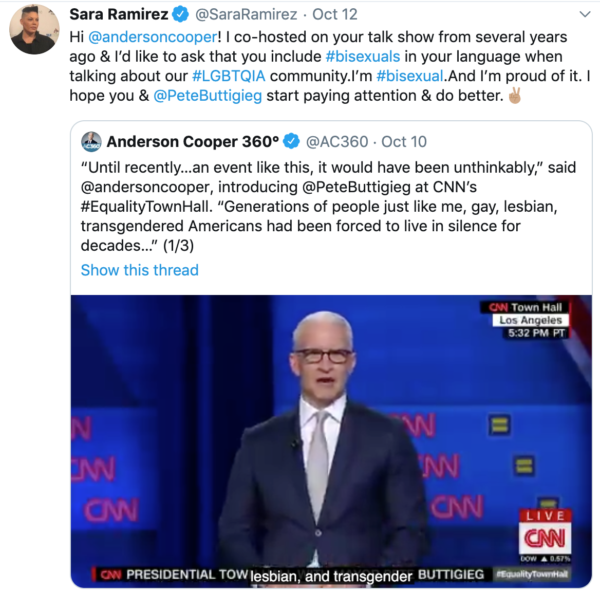
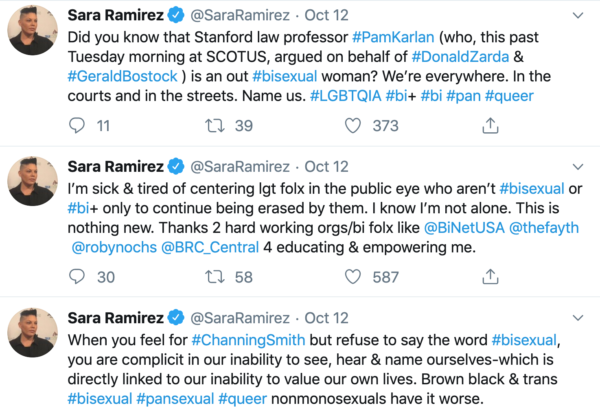
But the LGBTQ civil rights movement, which claims to seek social and economic justice, barely notices that there are more bisexuals than gay men, lesbians and trans people, according to the Williams Institute, and bisexuals are also at huge risk for poverty.
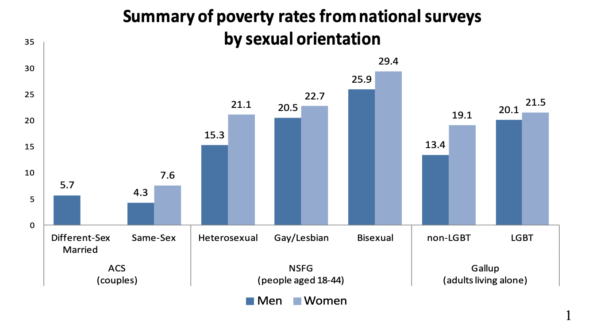
It is incumbent upon the LGBTQ community itself to raise and help solve these issues – including finding those 2 million LGBTQ unregistered voters and educating them about the historical significance of the 2020 elections.
See HRC highlights here. See CNN Live blog highlights here. Find CNN transcripts of all the town halls here.
All photos, except screen grabs, are by Daniel Sliwa for the Los Angeles Blade.
National
Washington Blade among targets of hostile online scammers
Gay Parent Magazine’s Facebook page deleted in attack

Gay Parent Magazine and the Washington Blade have taken steps to alert LGBTQ media publications about what appears to be an organized scam operation that deleted Gay Parent Magazine’s Facebook page and attempted unsuccessfully to infiltrate the Blade’s Facebook page.
The action by the unidentified scammers targeting Gay Parent Magazine and the Blade appeared to be aimed at LGBTQ media outlets with the intent of harming or disabling LGBTQ supportive publications, according to Gay Parent Magazine editor and publisher Angeline Acain and Blade editor Kevin Naff.
“We have strong reason to believe our Facebook page hacking was politically motivated,” Acain said in a July 7 statement. “We were targeted by people who don’t support LGBTQ parents,” she said.
Both Acain and Naff said they were contacted via email by someone claiming to be podcaster Jennifer Welch, a pro-LGBTQ commentator, inviting them to appear as a guest on her podcast.
“When I accepted, she emailed to set up a Zoom call to review technical requirements because she conducts her interviews via Facebook Live,” Naff said. “When I connected to Zoom, she wasn’t on camera and a man’s voice then said he handles her technical support. He instructed me to log into the administrative page of the Blade’s Facebook account and to share my screen,” Naff said. “That’s when I became suspicious and declined the request and ended the call.”
Naff said he had not heard anything from them since that time.
Acain told the Blade she now regrets that she agreed to provide access information to her publication’s Facebook page when she too was invited to appear as a guest on a Jennifer Welch podcast.
“I did somehow give them access,” Acain said. “I don’t know exactly how they did it, but whatever I did, they knew what to do to gain access.”
In her July 7 statement, Acain said, “In this attack, bad actors posed as liberal podcast hosts and invited me to be a guest saying the podcast would be live streamed on their Facebook page. They then hacked into Gay Parent Magazine’s Facebook page and removed all of our followers. The next thing I knew our Facebook page was gone.”
She said the Facebook page had 30,000 followers before it was hacked. Since that time, she said, she and her team at Gay Parent Magazine have rebuilt the Facebook page and continue to take steps to rebuild its audience and followers.
Acain also says in her statement that her publication’s Facebook hacking took place about five months after the Facebook page was “attacked by trolls posting hateful comments at LGBTQ parents.” She said the barrage of hateful postings began shortly after Donald Trump took office as president.
“After weeks of reporting the hateful comments, blocking trolls, and limiting who could comment, the hateful rhetoric eventually stopped,” she said.
“In the 26 years since I’ve been publishing, this has never happened before,” she told the Blade. “Since Trump has been president all of this has been happening.”
“This is clearly an organized right-wing effort targeting queer media outlets,” Naff said in his own statement. “I immediately reached out to contacts in LGBTQ media warning them of this scam,” he said, adding that his personal Facebook account was also targeted by someone who posted anti-gay slurs.
The anti-LGBTQ postings that Acain reports began to target Gay Parent Magazine’s Facebook page took place after two prominent LGBTQ advocacy organizations, the Human Rights Campaign (HRC) and GLAAD, issued strongly worded statements criticizing Mark Zuckerberg, the CEO of Meta, the company that owns and operates Facebook and other social media outlets, for ending longstanding anti-LGBTQ hate speech polices.
In a Jan. 7 statement, GLAAD said the policy changes put in place by Meta “removed and adopted several sections of its Hateful Conduct Policy, rolling back safety guardrails for LGBTQ people, people of color, women, immigrants, and other protected groups.”
In its own statement released Jan. 15, HRC states, “When Mark Zuckerberg announced sweeping changes to Meta’s content moderation policies, he framed the move as a bold defense of free speech. But many, especially members of the LGBTQ+ community and allies, worry about what this means for safety on Meta’s platforms and fear this marks an open invitation for Meta users to engage in anti-LGBTQ+ abuse that will disempower and marginalize the community.”
Meta has said the policy change was aimed at increasing free speech and curtailing censorship on its social media platforms like Facebook.
The Blade couldn’t immediately confirm whether any other LGBTQ media outlets have been targeted by anti-LGBTQ scammers.

In a move aimed at adhering to Trump administration anti-transgender policy — which at first slipped by unnoticed — the United States Olympic & Paralympic Committee confirms it quietly changed eligibility rules this week, to prohibit transgender women from competing in women’s sporting events.
On page 3 of the committee’s “Athlete Safety Policy,” a new paragraph now appears, stating: “The USOPC is committed to protecting opportunities for athletes participating in sport. The USOPC will continue to collaborate with various stakeholders with oversight responsibilities, e.g., IOC, IPC, NGBs, to ensure that women have a fair and safe competition environment consistent with Executive Order 14201 and the Ted Stevens Olympic & Amateur Sports Act.”
Executive Order 14201, “Keeping Men Out of Women’s Sports,” was issued by President Donald Trump in February, as the Washington Blade reported. The contents and purpose of the E.O. are not mentioned in the policy addition, nor is there any instance of the word, “transgender.” There’s also no explanation as to how this ban will be enforced or whether it will be expanded to also apply to transgender male athletes or nonbinary athletes.
The New York Times was first to report the change by the Colorado Springs-based committee, which the newspaper said was made on Monday and confirmed by the committee on Tuesday.
That same day, the committee’s president, Gene Sykes, and CEO Sarah Hirshland sent a letter to the U.S. Olympic community, explaining that the change followed “a series of respectful and constructive conversations with federal officials,” sparked by Trump’s executive order.
“As a federally chartered organization, we have an obligation to comply with federal expectations. The guidance we’ve received aligns with the Ted Stevens Act, reinforcing our mandated responsibility to promote athlete safety and competitive fairness,” the committee wrote.
The Ted Stevens Act was signed into law by the late President Jimmy Carter in 1978 and provided the committee with its charter.
This change in policy comes as Los Angeles prepares to host the Summer Olympic games in 2028.
The NCAA changed its transgender participation policy in February, one day after Trump signed his E.O., which threatened to “rescind all funds” from organizations that allow trans athletes to participate in women’s sports.
Just last month, the USOPC had said decisions on trans athlete participation were to be made based on “fairness,” and “real data and science-based evidence rather than ideology,” and would be decided by each individual sport’s governing body, of which there are 54 member organizations.
The debate over transgender inclusion has ramped up significantly this year, fed largely by partisan political activity, despite the lack of rigorous scientific evidence showing trans athletes have any competitive advantage, as USA Today sports columnist Nancy Armour wrote last December.
Even so, International Olympic Committee president Kirsty Coventry announced last month that she was spearheading a task force to look into how to “protect the female category.”
On Friday, USA Fencing issued its new policy for transgender athletes. Starting Aug. 1, out trans women can only compete in the men’s category, and that same policy will also apply to nonbinary and intersex athletes, as well as trans men, according to The Times.
Both World Athletics and World Aquatics have already banned trans women who have gone through male puberty from competing. Bans also exist in swimming and track and field, and USA soccer is reviewing its eligibility rules for women, potentially to set limits on testosterone levels, according to the Los Angeles Times.
More than two-dozen states have laws on the books barring trans women and girls from participating in school sports. Courts across the country are reviewing those laws in lawsuits brought by advocates who call the policies discriminatory and cruel and say they unnecessarily target a statistically tiny number of athletes.
Although trans athletes have been able to compete since 2003, no out trans athletes qualified until the Tokyo 2020 games, held in 2021, according to out trans trailblazer and activist, Chris Mosier, whose website tracks trans and nonbinary athletes’ achievements and policies restricting their participation.
National
FDA approves new twice-yearly HIV prevention drug
Experts say success could inhibit development of HIV vaccine

The U.S. Food and Drug Administration (FDA) on June 18 approved a newly developed HIV/AIDS prevention drug that only needs to be taken by injection once every six months.
The new drug, lenacapavir, which is being sold under the brand name of Yeztugo by the pharmaceutical company Gilead Sciences that developed it, is being hailed by some AIDS activists as a major advancement in the years-long effort to end the HIV/AIDS epidemic in the U.S. and worldwide.
Although HIV prevention drugs, known as pre-exposure prophylaxis medication or PrEP, have been available since 2012, they initially required taking one or more daily pills. More recently, another injectable PrEP drug was developed that required being administered once every two months.
Experts familiar with the PrEP programs noted that while earlier drugs were highly effective in preventing HIV infection – most were 99 percent effective – they could not be effective if those at risk for HIV who were on the drugs did not adhere to taking their daily pills or injections every two months. Experts also point out that large numbers of people at risk for HIV, especially members of minority communities, are not on PrEP and efforts to reach out to them should be expanded.
“Today marks a monumental advance in HIV prevention,” said Carl Schmid, executive director of the D.C.-based HIV + Hepatitis Policy Institute, in a statement released on the day the FDA announced its approval of lenacapavir.
“Congratulations to the many researchers who spent 19 years to get to today’s approval, backed up by the long-term investment needed to get the drug to market,” he said.
Schmid added, “Long-acting PrEP is now not only effective for up to six months but also improves adherence and will reduce HIV infections – if people are aware of it and payers, including private insurers, cover it without cost-sharing as a preventive service.”
Schmid and others monitoring the nation’s HIV/AIDS programs have warned that proposed large scale cuts in the budget for the U.S. Centers for Disease Control and Prevention by the administration of President Donald Trump could seriously harm HIV prevention programs, including PrEP-related efforts.
“Dismantling these programs means that there will be a weakened public health infrastructure and much less HIV testing, which is needed before a person can take PrEP,” Schmid said in his statement.
“Private insurers and employers must also immediately cover Yeztugo as a required preventive service, which means that PrEP users should not face any cost-sharing or utilization management barriers,” he said.
In response to a request by the Washington Blade for comment, a spokesperson for Gilead Sciences released a statement saying the annual list price per person using Yeztugo in the U.S. is $28,218. But the statement says the company is working to ensure that its HIV prevention medication is accessible to all who need it through broad coverage from health insurance companies and some of its own support programs.
“We’ve seen high insurance coverage for existing prevention options – for example, the vast majority of consumers have a $0 co-pay for Descovy for PrEP in the U.S. – and we are working to ensure broad coverage for lenacapavir [Yeztugo],” the statement says. It was referring to the earlier HIV prevention medication developed by Gilead Sciences, Descovy.
“Eligible insured people will get help with their copay,” the statement continues. “Gilead’s Advancing Access Copay Savings Program may reduce out-of-pocket costs to as little as zero dollars,” it says. “Then for people without insurance, lenacapavir may be available free of charge for those who are eligible, through Gilead’s Advancing Access Patient Assistance Program.”
Gilead Sciences has announced that in the two final trial tests for Yeztugo, which it describes as “the most intentionally inclusive HIV prevention clinical trial programs ever designed,” 99.9 percent of participants who received Yeztugo remained negative. Time magazine reports that among those who remained HIV negative at a rate of 100 percent were men who have sex with men.
Time also reports that some HIV/AIDS researchers believe the success of the HIV prevention drugs like Gilead’s Yeztugo could complicate the so-far unsuccessful efforts to develop an effective HIV vaccine.
To be able to test a potential vaccine two groups of test subjects must be used, one that receives the test vaccine and the other that receives a placebo with no drug in it.
With highly effective HIV prevention drugs now available, it could be ethically difficult to ask a test group to take a placebo and continue to be at risk for HIV, according to some researchers.
“This might take a bit of the wind out of the sails of vaccine research, because there is something so effective in preventing HIV infection,” Time quoted Dr. David Ho, a professor of microbiology, immunology, and medicine at New York’s Columbia University as saying.
District of Columbia
Creators on the Frontlines: Inside D.C.’s influencer conference
The conference empowers creators to drive political awareness and action, particularly among young voters whose turnout in recent elections has been alarmingly low

The Trending Up Conference brought together influential digital voices, lawmakers, advocacy organizations and movement leaders to discuss how creators are redefining the political landscape. Last month, over 200 content creators gathered in the nation’s capital, not to chase likes or algorithmic trends, but to take meaningful action in shaping policy.
Through collaborative sessions on topics ranging from the economy and climate change to LGBTQ rights, immigration, reproductive rights, education and disability justice, the conference showcased the powerful role creators play in shaping public discourse. It also provided dedicated spaces for creators and policymakers to work side by side, building connections and strategizing for impactful change.
“The more we collaborate and work together, the more successful we will be in advocating for human rights for everyone,” said Barrett Pall, a life coach and influencer in the queer community.
Rep. Maxwell Frost (FL) the youngest member of Congress, discussed innovative strategies for civic engagement. He emphasized the importance of meeting young voters where they are — through culture, music, and storytelling — to combat political disengagement. Frost, a former organizer and musician himself, has long championed the use of creative platforms to mobilize underrepresented communities and inspire a new generation to participate in the democratic process.
His remarks aligned with a central goal of the conference: to empower creators to drive political awareness and action, particularly among young voters whose turnout in recent elections has been alarmingly low.
Warren emphasized the importance of creators in driving meaningful change.
“You are the people making America’s national conversation. What we’re trying to do here matters, and you’re part of that fight,” urged Sen. Warren, adding that they should recognize their power and responsibility. “If enough of us tell enough stories, we’ve got a real chance to build a country where every kid has a fighting chance.”
She continued by reinforcing the value of our voices.
“This moment is up to you to make the decision,” she said. Warren then asked the audience, “what are you going to do when your country is in real trouble?” Warren’s message was clear: creators are essential in this moment and our voices must be uplifted and leveraged in the fight to reshape the nation for the better.
“We need to find ways to talk to each other across this nation and that conversation starts with all of you,” she said.
Former Transportation Secretary Pete Buttigieg also emphasized the importance of reaching audiences across all platforms.
“Whether it’s going on Fox or going on Flagrant, how can I blame somebody for not embracing the message that I believe in if they haven’t heard it? We’ve gotta be cross-cutting these platforms [or else] no one is persuading anybody,” said Buttigieg.
He believes in meeting people where they are, spreading progressive messaging in language that resonates, and ensuring that those who might not typically hear his message have access to it.
“Democrats used to think that they were the ones who were digitally savvy,” he added. “The algorithm is not neutral.” A recent study revealed that TikTok’s algorithm during the 2024 presidential race disproportionately recommended conservative content — Republican posts received 11.8% more recommendations than Democratic content. This highlights how platforms themselves can skew the political narrative, further underscoring the necessity for creators to actively push back against these digital biases.
“What we build next has to be different from what we inherited,” Buttigieg said. “You are at the very heart of that — that’s why I’m here today.”
While Buttigieg advocates for engaging across platforms, California Governor Gavin Newsom’s approach has raised concerns. Instead of using his platform to meet a broad spectrum of voters, Newsom has recently chosen to amplify far-right voices. His decision to invite extremist figures like Charlie Kirk and Steve Bannon onto his podcast under the guise of creating a “middle ground” is deeply troubling. At the same time, Newsom — who once championed California as a sanctuary for transgender youth and a defender of inclusive education—has taken a stance against transgender women and girls competing in female sports, calling it “deeply unfair.”
“I think it’s an issue of fairness. I completely agree with you on that. It is an issue of fairness, it’s deeply unfair. We’ve got to own that. We’ve got to acknowledge it,” he told Kirk. This capitulation to conservative talking points doesn’t just undermine his past work—it emboldens those who are trying to dismantle hard-won rights.
At Trending Up, creators pushed back against this political drift by meeting directly with California representatives to discuss urgent social issues — including threats to Medicaid, the pink tax, disability rights and the disproportionate impact of billionaire tax breaks. Across these conversations, one thing was clear: creators are not just influencers. We are educators, mobilizers and trusted voices in out communities, capable of translating policy into stories people care about.
Tiffany Yu reflected that Rep. Sydney Kamlager-Dove’s presence alone spoke volumes: “Her showing up to create content with us meant that she understood we as creators are more than just influencers — we’re mobilizers and educators.” Ashley Nicole echoed this sentiment after meeting with Speaker Nancy Pelosi.
“When people know, they will resist — but they have to know about it,” said Nicole. That quote stuck with me because it highlights how important it is to get information in front of people in a way they can connect with.”
Loren Piretra emphasized the urgency of economic justice: “We talked about the billionaire tax breaks…and how most people don’t realize they’re closer to being unhoused than to being billionaires.” Meanwhile, Nikki Sapiro Vinckier described her conversation with Rep. Ami Bera as a rare moment of digital fluency from an elected official.
“His willingness to engage on camera signals that he sees value in creator-led political communication, which isn’t always the case.”
These interactions underscore the evolving role of content creators as vital conduits between policymakers and the public. By translating political complexity into accessible, engaging content, creators aren’t just informing their audiences — they’re mobilizing them toward meaningful civic engagement.
In a media landscape dominated by far-right outrage and rampant disinformation, creators using their platforms for good are a powerful counterforce—reclaiming truth and championing the issues that matter most. While extremist voices often dominate the conversation, the majority of Americans stand with the progressive causes creators at Trending Up are fighting for: reproductive rights, LGBTQ protections, and climate action. It’s time for elected officials to stop pandering to the far-right and start amplifying the voices of the people driving change.
This moment demands more than political compromise — it calls for bold leadership that empowers creators who are already shaping a better future. Uplifting these voices is not just strategic; it is crucial for protecting democracy and ensuring that progress, not division, is at the heart of our nation’s political discourse.
U.S. Supreme Court
Activists rally for Andry Hernández Romero in front of Supreme Court
Gay asylum seeker ‘forcibly deported’ to El Salvador, described as political prisoner
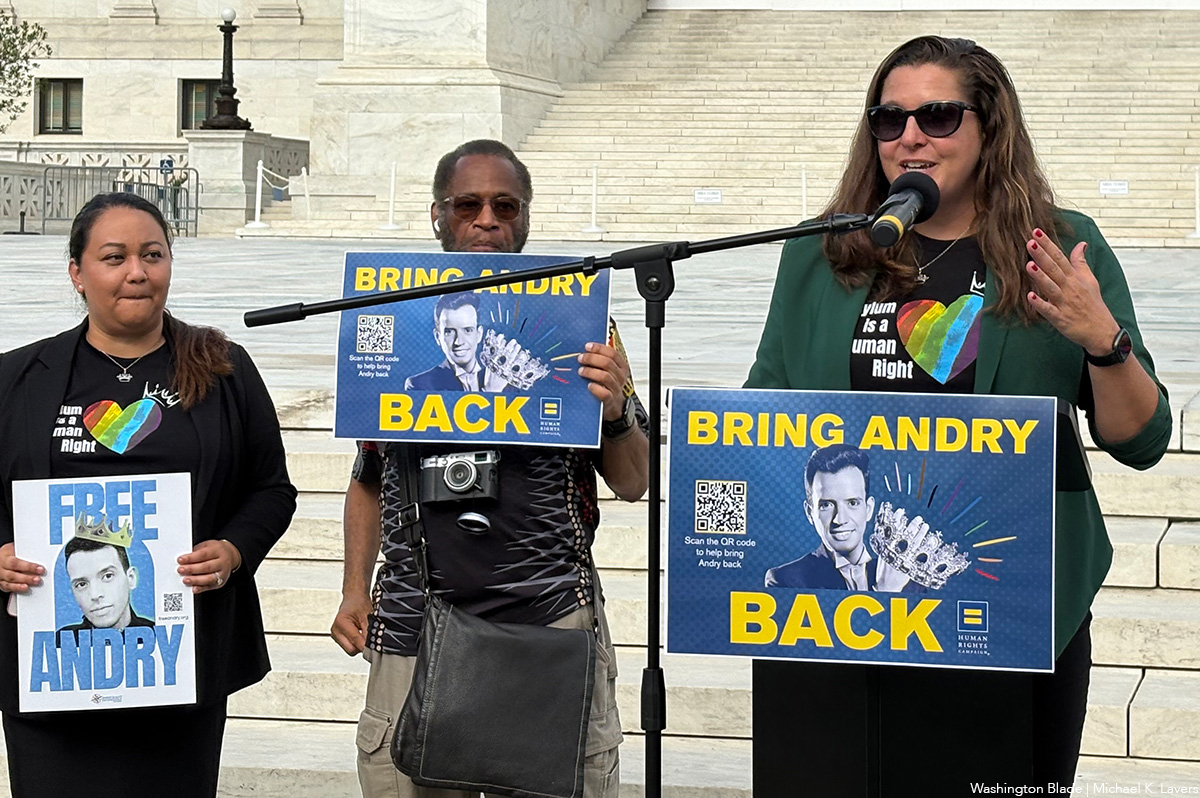
More than 200 people gathered in front of the U.S. Supreme Court on Friday and demanded the Trump-Vance administration return to the U.S. a gay Venezuelan asylum seeker who it “forcibly disappeared” to El Salvador.
Lindsay Toczylowski, president of the Immigrant Defenders Law Center, a Los Angeles-based organization that represents Andry Hernández Romero, is among those who spoke alongside U.S. Rep. Mark Takano (D-Calif.) and Human Rights Campaign Campaigns and Communications Vice President Jonathan Lovitz. Sarah Longwell of the Bulwark, Pod Save America’s Jon Lovett, and Tim Miller are among those who also participated in the rally.
“Andry is a son, a brother. He’s an actor, a makeup artist,” said Toczylowski. “He is a gay man who fled Venezuela because it was not safe for him to live there as his authentic self.”
(Video by Michael K. Lavers)
The White House on Feb. 20 designated Tren de Aragua, a Venezuelan gang, as an “international terrorist organization.”
President Donald Trump on March 15 invoked the Alien Enemies Act of 1798, which the Associated Press notes allows the U.S. to deport “noncitizens without any legal recourse.” The Trump-Vance administration subsequently “forcibly removed” Hernández and hundreds of other Venezuelans to El Salvador.
Toczylowski said she believes Hernández remains at El Salvador’s Terrorism Confinement Center, a maximum-security prison known by the Spanish acronym CECOT. Toczylowski also disputed claims that Hernández is a Tren de Aragua member.
“Andry fled persecution in Venezuela and came to the U.S. to seek protection. He has no criminal history. He is not a member of the Tren de Aragua gang. Yet because of his crown tattoos, we believe at this moment that he sits in a torture prison, a gulag, in El Salvador,” said Toczylowski. “I say we believe because we have not had any proof of life for him since the day he was put on a U.S. government-funded plane and forcibly disappeared to El Salvador.”
“Andry is not alone,” she added.
Takano noted the federal government sent his parents, grandparents, and other Japanese Americans to internment camps during World War II under the Alien Enemies Act. The gay California Democrat also described Hernández as “a political prisoner, denied basic rights under a law that should have stayed in the past.”
“He is not a case number,” said Takano. “He is a person.”
Hernández had been pursuing his asylum case while at the Otay Mesa Detention Center in San Diego.
A hearing had been scheduled to take place on May 30, but an immigration judge the day before dismissed his case. Immigrant Defenders Law Center has said it will appeal the decision to the Board of Immigration Appeals, which the Justice Department oversees.
“We will not stop fighting for Andry, and I know neither will you,” said Toczylowski.
Friday’s rally took place hours after Attorney General Pam Bondi said Kilmar Abrego Garcia, a Maryland man who the Trump-Vance administration wrongfully deported to El Salvador, had returned to the U.S. Abrego will face federal human trafficking charges in Tennessee.
National
A husband’s story: Michael Carroll reflects on life with Edmund White
Iconic author died this week; ‘no sunnier human in the world’

Unlike most gay men of my generation, I’ve only been to Fire Island twice. Even so, the memory of my first visit has never left me. The scenery was lovely, and the boys were sublime — but what stood out wasn’t the beach or the parties. It was a quiet afternoon spent sipping gin and tonics in a mid-century modern cottage tucked away from the sand and sun.
Despite Fire Island’s reputation for hedonism, our meeting was more accident than escapade. Michael Carroll — a Facebook friend I’d chatted with but never met — mentioned that he and his husband, Ed, would be there that weekend, too. We agreed to meet for a drink. On a whim, I checked his profile and froze. Ed was author Edmund White.
I packed a signed copy of Carroll’s “Little Reef” and a dog-eared hardback of “A Boy’s Own Story,” its spine nearly broken from rereads. I was excited to meet both men and talk about writing, even briefly.
Yesterday, I woke to the news that Ed had passed away. Ironically, my first thought was of Michael.
This week, tributes to Edmund White are everywhere — rightly celebrating his towering legacy as a novelist, essayist, and cultural icon. I’ve read all of his books, and I could never do justice to the scope of a career that defined and chronicled queer life for more than half a century. I’ll leave that to better-prepared journalists.
But in those many memorials, I’ve noticed something missing. When Michael Carroll is mentioned, it’s usually just a passing reference: “White’s partner of thirty years, twenty-five years his junior.” And yet, in the brief time I spent with this couple on Fire Island, it was clear to me that Michael was more than a footnote — he was Ed’s anchor, editor, companion, and champion. He was the one who knew his husband best.
They met in 1995 after Michael wrote Ed a fan letter to tell him he was coming to Paris. “He’d lost the great love of his life a year before,” Michael told me. “In one way, I filled a space. Understand, I worshiped this man and still do.”
When I asked whether there was a version of Ed only he knew, Michael answered without hesitation: “No sunnier human in the world, obvious to us and to people who’ve only just or never met him. No dark side. Psychology had helped erase that, I think, or buffed it smooth.”
Despite the age difference and divergent career arcs, their relationship was intellectually and emotionally symbiotic. “He made me want to be elegant and brainy; I didn’t quite reach that, so it led me to a slightly pastel minimalism,” Michael said. “He made me question my received ideas. He set me free to have sex with whoever I wanted. He vouchsafed my moods when they didn’t wobble off axis. Ultimately, I encouraged him to write more minimalistically, keep up the emotional complexity, and sleep with anyone he wanted to — partly because I wanted to do that too.”
Fully open, it was a committed relationship that defied conventional categories. Ed once described it as “probably like an 18th-century marriage in France.” Michael elaborated: “It means marriage with strong emotion — or at least a tolerance for one another — but no sex; sex with others. I think.”
That freedom, though, was always anchored in deep devotion and care — and a mutual understanding that went far beyond art, philosophy, or sex. “He believed in freedom and desire,” Michael said, “and the two’s relationship.”
When I asked what all the essays and articles hadn’t yet captured, Michael paused. “Maybe that his writing was tightly knotted, but that his true personality was vulnerable, and that he had the defense mechanisms of cheer and optimism to conceal that vulnerability. But it was in his eyes.”
The moment that captured who Ed was to him came at the end. “When he was dying, his second-to-last sentence (garbled then repeated) was, ‘Don’t forget to pay Merci,’ the cleaning lady coming the next day. We had had a rough day, and I was popping off like a coach or dad about getting angry at his weakness and pushing through it. He took it almost like a pack mule.”
Edmund White’s work shaped generations — it gave us language for desire, shame, wit, and liberation. But what lingers just as powerfully is the extraordinary life Ed lived with a man who saw him not only as a literary giant but as a real person: sunny, complex, vulnerable, generous.
In the end, Ed’s final words to his husband weren’t about his books or his legacy. They were about care, decency, and love. “You’re good,” he told Michael—a benediction, a farewell, maybe even a thank-you.
And now, as the world celebrates the prolific writer and cultural icon Edmund White, it feels just as important to remember the man and the person who knew him best. Not just the story but the characters who stayed to see it through to the end.
U.S. Federal Courts
Immigration judge dismisses Andry Hernández Romero’s asylum case
Gay makeup artist from Venezuela ‘forcibly removed’ to El Salvador in March

An immigration judge on Tuesday dismissed the asylum case of a gay makeup artist from Venezuela who the U.S. “forcibly removed” to El Salvador.
The Immigrant Defenders Law Center represents Andry Hernández Romero.
The Los Angeles-based organization in a press release notes Immigration Judge Paula Dixon in San Diego granted the Department of Homeland Security’s motion to dismiss Hernández’s case. A hearing had been scheduled to take place on Wednesday.
Hernández asked for asylum because of persecution he said he suffered in Venezuela because of his sexual orientation and political beliefs. NBC News reported Hernández pursued his case while at the Otay Mesa Detention Center in San Diego.
The Trump-Vance administration in March “forcibly removed” Hernández and other Venezuelans from the U.S. and sent them to El Salvador.
The White House on Feb. 20 designated Tren de Aragua, a Venezuelan gang, as an “international terrorist organization.”
President Donald Trump on March 15 invoked the Alien Enemies Act of 1798, which the Associated Press notes allows the U.S. to deport “noncitizens without any legal recourse.” Hernández is one of the lead plaintiffs in a lawsuit that seeks to force the U.S. to return those sent to El Salvador under the 18th century law.
The Immigrant Defenders Law Center says officials with U.S. Immigration and Customs Enforcement and U.S. Customs and Border Protection claimed Hernández is a Tren de Aragua member because of his tattoos. Hernández and hundreds of other Venezuelans who the Trump-Vance administration “forcibly removed” from the U.S. remain at El Salvador’s Terrorism Confinement Center, a maximum-security prison known by the Spanish acronym CECOT.
Homeland Security Secretary Kristi Noem earlier this month told gay U.S. Rep. Robert Garcia (D-Calif.) during a House Homeland Security Committee hearing that Hernández “is in El Salvador” and questions about his well-being “would be best made to the president and to the government of El Salvador.” Garcia, along with U.S. Reps. Maxwell Alejandro Frost (D-Fla.), Maxine Dexter (D-Ore.), and Yassamin Ansari (D-Ariz.), were unable to meet with Hernández last month when they traveled to the Central American country.
“DHS is doing everything it can to erase the fact that Andry came to the United States seeking asylum and he was denied due process as required by our Constitution,” said Immigrant Defenders Law Center President Lindsay Toczylowski on Thursday in the press release her organization released. “We should all be incredibly alarmed at what has happened in Andry’s case. The idea that the government can disappear you because of your tattoos, and never even give you a day in court, should send a chill down the spine of every American. If this can happen to Andry, it can happen to any one of us.”
Toczylowski said the Immigrant Defenders Law Center will appeal Dixon’s decision to the Board of Immigration Appeals, which the Justice Department oversees.
The Immigrant Defenders Law Center, the Human Rights Campaign, and other groups on June 6 plan to hold a rally for Hernández outside the U.S. Supreme Court. Protesters in Venezuela have also called for his release.
“Having tattoos does not make you a delinquent,” reads one of the banners that protesters held.
National
Discredited former cop played ‘key role’ in deportation of gay make-up artist
Former police officer claimed that Andry Hernandez Romero was a member of Venezuelan gang ‘Tren de Aragua’

A new investigation points to a discredited, former police officer who played a “key role” in the wrongful deportation of Andry Hernández Romero, a gay asylum seeker and make-up artist who was sent to a prison in El Salvador under Trump’s Alien Enemies Act.
USA Today found in a recent investigation that the former Milwaukee police officer who filed the report about Hernández Romero, citing his tattoos as the reason for the alleged gang affiliation, has a long history of credibility and disciplinary issues in his former police officer position.
The private prison employee who previously worked as a police officer until he was fired for driving into a house while intoxicated—among other alcohol-related incidents—“helped seal the fate,” of Hernández Romero.
The investigation by USA Today found that the former police officer accused Hernández Romero of being a part of the Tren de Aragua gang because of Romero’s two crown tattoos with the words “mom,” and “dad,” which are now being identified as Venezuelan gang-related symbols.
Since then, his story has made headlines across the nation because Hernández Romero not only has no criminal record, but is legally seeking asylum in the U.S. due to credible threats of violence against him in Venezuela because of LGBTQ persecution.
He was targeted shortly after Trump invoked the Alien Enemies Act of 1798, which is a proclamation for all law enforcement officials to “apprehend, restrain, secure and remove every Alien Enemy described in section 1 of [the] proclamation.”
Charles Cross Jr., the former police officer, signed the report that wrongfully identified Hernández Romero as a gang member. Cross was fired in 2012 after many incidents relating to his credibility and how it was affecting the credibility of the Milwaukee Police Department to testify in court.
He had already been under investigation previously for claiming overtime pay that he never earned. In 2007, he had faced criminal charges for damage to property, according to court records.
In March, The Washington Blade spoke with the Immigrant Defenders Law Center Litigation and Advocacy Director Alvaro M. Huerta regarding the case who stated that “officials with U.S. Immigration and Customs Enforcement and U.S. Customs and Border Protection alleged his organization’s client was a member of Tren de Aragua, a Venezuela-based gang, because of his tattoos and no other information.”
Hernandez Romero came to the United States last year in search of asylum and now makes up one of 238 Venezuelan immigrants who were deported from the U.S. to El Salvador, Honduras and Venezuela. Many of those being deported are being sent to the Center for Terrorism Confinement, a maximum-security mega-prison in El Salvador, which has been accused of human rights violations.
According to the investigation, the Department of Homeland Security “wouldn’t offer further details on the case, or the process in general, but reiterated that the department uses more than just tattoos to determine gang allegiance.”
His story is now being looked at as a cautionary tale for the lack of due process the U.S. government is taking, as the Department of Homeland Security (DHS) and Immigration and Customs Enforcement (ICE) ramp up deportations across the nation.
Organizations like the Human Rights Campaign are now calling for Secretary of State Marco Rubio and Secretary of Homeland Security Kristi Noem to cease wrongful deportations and return Hernández Romero home. The petition also urges the U.S. government to afford all Americans, including nationals and asylum seekers residing in the U.S., due process of law as required by the Constitution.
National
LGBTQ+ asylum seeker ‘forcibly removed’ from US, sent to El Salvador
Immigrant Defenders Law Center represents Venezuelan national

An immigrant rights group that represents an LGBTQ+ asylum seeker from Venezuela says the Trump-Vance administration on March 15 “forcibly removed” him from the U.S. and sent him to El Salvador.
Immigrant Defenders Law Center Litigation and Advocacy Director Alvaro M. Huerta during a telephone interview with the Los Angeles Blade on Tuesday said officials with U.S. Immigration and Customs Enforcement and U.S. Customs and Border Protection alleged his organization’s client was a member of Tren de Aragua, a Venezuela-based gang, because of his tattoos and no other information.
“It’s very flimsy,” said Huerta. “These are the types of tattoos that any artist in New York City or Los Angeles would have. It’s nothing that makes him a gang member.”
The White House on Feb. 20 designated Tren de Aragua an “international terrorist organization.”
President Donald Trump on March 15 invoked the Alien Enemies Act of 1798, which the Associated Press notes allows the U.S. to deport “noncitizens without any legal recourse.”
“I proclaim that all Venezuelan citizens 14 years of age or older who are members of TdA (Tren de Aragua), are within the United States, and are not actually naturalized or lawful permanent residents of the United States are liable to be apprehended, restrained, secured, and removed as alien enemies,” said Trump in a proclamation that announced his invocation of the 18th century law.
The asylum seeker — who the Immigrant Defenders Law Center has not identified by name because he is “in danger” — is among the hundreds of Venezuelans who the U.S. sent to El Salvador on March 15.
Chief Judge James E. Boasberg of the U.S. District Court for the District of Columbia temporarily blocked the deportations. The AP notes the flights were already in the air when Boasberg issued his ruling.
Huerta said U.S. officials on Monday confirmed the asylum seeker is “indeed in El Salvador.” He told the Blade it remains unclear whether the asylum seeker is in the country’s Terrorism Confinement Center, a maximum-security prison known by the Spanish acronym CECOT.
‘We couldn’t find him’
Huerta said the Immigrant Defenders Law Center client fled Venezuela and asked for asylum in the U.S.
The asylum seeker, according to Huerta, passed a “credible fear interview” that determines whether an asylum claim is valid. Huerta said U.S. officials detained the asylum seeker last year when he returned to the country from the Mexican border city of Tijuana.
Huerta told the Blade the asylum seeker was supposed to appear before an immigration judge on March 13.
“We couldn’t find him,” said Huerta.
He noted speculation over whether Trump was about to invoke the Alien Enemies Act, and the Immigrant Defenders Law Center “started getting concerned that maybe he was caught up in this situation.”
“He’s an LGBT individual who is an artist in Venezuela,” said Huerta.
Neither ICE nor CBP have responded to the Blade’s request for comment.
Huerta said it is “hard to say” whether the asylum seeker has any legal recourse.
“He still has an ongoing case in immigration court here,” said Huerta, noting the asylum seeker’s attorney was in court on Monday, and has another hearing in two weeks. “Presumably they should have to allow him to appear, at least virtually, for court because he still has these cases.”
Huerta noted the U.S. since Trump took office has deported hundreds of migrants to Panama; officials in the Central American country have released dozens of them from detention. Migrants sent to the Guantánamo Bay naval base in Cuba have returned to detention facilities in the U.S.
“Something where the government, kind of unliterally, can just say that someone is a gang member based on tattoos, without any offer of proof, without having to go to court to say that and then take them externally to what effectively a prison state (El Salvador), it certainly is completely just different than what we’ve seen,” Huerta told the Blade.
Huerta also spoke about the Trump-Vance administration’s overall immigration policy.
“The Trump administration knows exactly what they’re doing when it comes to scapegoating immigrants, scapegoating asylees,” he said. “They have a population that, in many ways, is politically powerless, but in many other ways, is politically powerful because they have other folks standing behind them as well, but they’re an easy punching bag.”
“They can use this specter of we’re just deporting criminals, even though they’re the ones who are saying that they’re criminal, they’re not necessarily proving that,” added Huerta. “They feel like they can really take that fight and run with it, and they’re testing the bounds of what they can get away with inside and outside of the courtroom.”
National
Trump administration considering closing HIV prevention agency: reports
Sources say funding cuts possible for CDC

The Department of Health and Human Services is considering closing the HIV Prevention Division of the U.S. Centers for Disease Control and Prevention and transferring some of its programs to a different agency, according to a report by the New York Times.
The Times and Politico cited government sources who spoke on condition of not being identified as saying plans under consideration from the administration also call for possible funding cuts in the domestic HIV prevention program following funding cuts already put in place for foreign U.S. HIV programs.
“It’s not 100 percent going to happen, but 100 percent being discussed,” the Times quoted one of the sources as saying.
News of the possible shutdown of the HIV Prevention Division and possible cuts in HIV prevention funds prompted 13 of the nation’s leading LGBTQ, HIV, and health organizations to release a joint statement on March19 condemning what they said could result in a “devastating effect” on the nation’s progress in fighting AIDS.
Among the organizations signing on to the joint statement were D.C.’s Whitman-Walker Health and the Los Angeles LGBT Center.
Carl Schmid, executive director of the HIV + Hepatitis Policy Institute, which opposes funding cuts or curtailment in domestic AIDS programs, points out in a separate statement that it was President Trump during his first term in office who put in place the HIV Epidemic Initiative, which calls for ending the HIV epidemic in the U.S. by 2030.
That initiative, which Trump announced in his 2019 State of the Union address, is credited with having reduced new HIV infections nationwide by 30 percent in adolescents and young adults, and by about 10 percent in most other groups, according to the Times report on possible plans to scale back the program.
In a statement released to Politico, HHS spokesperson Andrew Nixon said, “HHS is following the Administration’s guidance and taking a careful look at all divisions to see where there is overlap that could be streamlined to support the President’s broader efforts to restructure the federal government.”
“No final decision on streamlining CDC’s HIV Prevention Division has been made,” Nixon said in his statement.
“An effort to defund HIV prevention by this administration would set us back decades, cost innocent people their lives and cost taxpayers millions,” said Kelley Robinson, president of the Human Rights Campaign, the nation’s largest LGBTQ advocacy organization, in a March 19 statement.
“The LGBTQ+ community still carries the scars of the government negligence and mass death of the HIV/AIDS epidemic,” Robinson said. “We should be doubling down on our investment to end the HIV epidemic once and for all, not regressing to the days of funeral services and a virus running rampant,” she said.
“We are outraged and deeply alarmed by the Trump administration’s reckless moves to defund and de-prioritize HIV prevention,” the statement released by the 13 organizations says. “These abrupt and incomprehensible possible cuts threaten to reverse decades of progress, exposing our nation to a resurgence of a preventable disease with devastating and avoidable human and financial costs,” the statement says.
-

 Commentary4 days ago
Commentary4 days agoThe Westside is unaffordable. Allowing for more housing can help
-

 Features3 days ago
Features3 days agoStill here, still fighting: A trans Latina’s stand against ICE in Orange County
-

 Movies5 days ago
Movies5 days agoRestored film offers inside look at ‘80s gay Berlin
-

 Opinions5 days ago
Opinions5 days agoVacationing abroad with an embarrassment in the White House
-

 Events5 days ago
Events5 days agoThe Blade wins Excellence in LGBTQ+ Reporting Newsroom Award at NLGJA Los Angeles Press Pride event
-

 a&e features5 days ago
a&e features5 days agoCharles Galin King brings cultural influences and style to Revry’s ‘King of Drag,’ the first-ever drag king television competition series
-

 LGBTQ Non-Profit Organizations1 day ago
LGBTQ Non-Profit Organizations1 day agoUniting for justice: How the TransLatin@ Coalition is leading in a time of attacks
-

 Books1 day ago
Books1 day agoGet happy and read new book on Judy Garland
-

 National15 hours ago
National15 hours agoWashington Blade among targets of hostile online scammers



